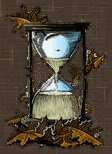
Square or setting off firecrackers at midnight; the world transitions the old and welcomes the new with different customs or superstitions.
 In some towns in Italy, watch out for falling objects. People shove their old sofas, chairs and even refrigerators out of windows on New Year's Eve so they can buy new ones.
In some towns in Italy, watch out for falling objects. People shove their old sofas, chairs and even refrigerators out of windows on New Year's Eve so they can buy new ones.Or, take the current year’s coins, place them face up on the window sill on New Year’s Eve to bring good luck.
On New Year’s Day, Italians serve lentils, raisins, and oranges, symbols of riches, good luck, and the promise of love. (Bring on the Pepto!!)
 In Denmark young people pound on their friends' front doors and throw shards of pottery, collected from the past year, against the sides of houses. (And we thought we had it loud!)
In Denmark young people pound on their friends' front doors and throw shards of pottery, collected from the past year, against the sides of houses. (And we thought we had it loud!) In Greece, singing children go door-to-door, carrying fruit, a paper ship or star and a green rod cut from a cornel-tree. They tap the family members on the back with the rod for luck. It's customary to throw a pomegranate wrapped in silver foil on the threshold, to spread the seeds of good luck for an abundant year. (Caution, slippery when wet.)
In Greece, singing children go door-to-door, carrying fruit, a paper ship or star and a green rod cut from a cornel-tree. They tap the family members on the back with the rod for luck. It's customary to throw a pomegranate wrapped in silver foil on the threshold, to spread the seeds of good luck for an abundant year. (Caution, slippery when wet.) In Iceland , a pantry window is left open and the frost is gathered and saved in a pot marked with a cross, for prosperity to the home. Icelanders believe that elves move into the house on New Year‘s Eve, and could be coerced into giving treasure to those who intercepted them at crossroads.
In Iceland , a pantry window is left open and the frost is gathered and saved in a pot marked with a cross, for prosperity to the home. Icelanders believe that elves move into the house on New Year‘s Eve, and could be coerced into giving treasure to those who intercepted them at crossroads. In Armenia on New Year‘s Eve, goodies are lowered down the chimney on a rope. (No mention if a roaring fire is part of this ritual!)
In Armenia on New Year‘s Eve, goodies are lowered down the chimney on a rope. (No mention if a roaring fire is part of this ritual!)In Poland pickled herring is eaten to insure luck and prosperity. (Burp!)
 In Ecuador, people make straw stuffed dummies and burn them in effigies at midnight, symbolically getting rid of the past. (Checked the smoke detector batteries lately!)
In Ecuador, people make straw stuffed dummies and burn them in effigies at midnight, symbolically getting rid of the past. (Checked the smoke detector batteries lately!) (The ultimate beach party!) In Rio de Janeiro, on New Year’s Eve, more than a million people gather on the beaches to honor the "Mother of the Sea," who brings good fortune.
(The ultimate beach party!) In Rio de Janeiro, on New Year’s Eve, more than a million people gather on the beaches to honor the "Mother of the Sea," who brings good fortune.Even the color of underwear Brazilians wear on New Year’s Day has meaning.
Pink brings love, yellow, prosperity; and white, peace and happiness. (Hanes & Fruit of the Loom stocks soar!)
 British say,
British say,Take out,
Then take in,
Bad luck will begin,
Take in, then take out
On New Year’s Day, don’t sweep or you will sweep your good luck away, or take anything out of the house-even trash. (Housewife Holiday!)
To insure abundance, bring in new things and if you carry something out, be sure to bring something else in first, preferably a coin concealed outside the previous night.
 In Southern U.S. and the Caribbean its tradition that certain foods are eaten, such as Hoppin' John, a dish of field peas or crowder peas (black-eyed peas) and rice, chopped onion and sliced bacon, or substitute ham hock or fatback for the conventional bacon; optional green peppers or vinegar and spices. Eating Hoppin' John on New Year's Day is thought to bring a year filled with luck, and it's eaten by everyone.
In Southern U.S. and the Caribbean its tradition that certain foods are eaten, such as Hoppin' John, a dish of field peas or crowder peas (black-eyed peas) and rice, chopped onion and sliced bacon, or substitute ham hock or fatback for the conventional bacon; optional green peppers or vinegar and spices. Eating Hoppin' John on New Year's Day is thought to bring a year filled with luck, and it's eaten by everyone.The peas, or beans with little black “eyes,” signify coins. Fill your plate with them and your cup will run over, as in the 23rd Psalm. Serving Collard greens symbolizing green money and wealth, and cornbread for gold. On the day after New Year's Day, leftover "Hoppin' John" is called "Skippin' Jenny," demonstrates frugality, and brings an even better chance of prosperity in the New Year.
 In Vienna, Austria, pigs are let loose in restaurants and everyone tries to touch them for luck as they run by. In homes, a marzipan pig, with a gold piece in its mouth, is suspended from a ribbon and touched instead. (Ms. Piggy must be a citizen of Austria!)
In Vienna, Austria, pigs are let loose in restaurants and everyone tries to touch them for luck as they run by. In homes, a marzipan pig, with a gold piece in its mouth, is suspended from a ribbon and touched instead. (Ms. Piggy must be a citizen of Austria!) In Spanish-speaking countries, at midnight, people put 13 grapes into their wine or champagne glass. The grapes represent the 12 months of the old year and 1 for the new year. At midnight, after a toast, people eat the grapes as quickly as possible, making a wish on each one.
In Spanish-speaking countries, at midnight, people put 13 grapes into their wine or champagne glass. The grapes represent the 12 months of the old year and 1 for the new year. At midnight, after a toast, people eat the grapes as quickly as possible, making a wish on each one. For Japanese it’s a customary money tree. Pine and cypress branches are decorated with old coins, paper pomegranates and flowers.
For Japanese it’s a customary money tree. Pine and cypress branches are decorated with old coins, paper pomegranates and flowers.Or, old coins strung on colored threads in the shape of dragon and put at the foot of children's beds. It is called "cash to pass the year", to be saved and not spent.
Today, a money gifts are given in red envelopes.
Now the brain teaser -- how many of you remember this Soupy Sales telecast that got him in trouble....
 On New Year's Day 1965, miffed at having to work on the holiday, Soupy Sales ended his live broadcast by encouraging his young viewers to tiptoe into their still-sleeping parents' bedrooms and remove those "funny green pieces of paper with pictures of U.S. Presidents" from their pants and pocketbooks.
On New Year's Day 1965, miffed at having to work on the holiday, Soupy Sales ended his live broadcast by encouraging his young viewers to tiptoe into their still-sleeping parents' bedrooms and remove those "funny green pieces of paper with pictures of U.S. Presidents" from their pants and pocketbooks."Put them in an envelope and mail them to me," Soupy instructed the children. "And I'll send you a postcard from Puerto Rico!" He was then hit with a pie.
Several days later, a chagrined Soupy announced that money was unexpectedly being received in the mail. He explained that he had been joking and announced that unreturnable contributions would be donated to charity.
As parents' complaints increased, WNEW's management felt compelled to suspend Sales for two weeks. Young viewers picketed Channel 5. The uproar surrounding Sales' suspension increased his popularity.
Sales describes the incident in his 2001 autobiography Soupy Sez! My Life and Zany Times.
 HAPPY NEW YEAR TO ALL!
HAPPY NEW YEAR TO ALL!On New Year's Day 1965, miffed at having to work on the holiday, Soupy Sales ended his live broadcast by encouraging his young viewers to tiptoe into their still-sleeping parents' bedrooms and remove those "funny green pieces of paper with pictures of U.S. Presidents" from their pants and pocketbooks.
"Put them in an envelope and mail them to me," Soupy instructed the children. "And I'll send you a postcard from Puerto Rico!" He was then hit with a pie.
Several days later, a chagrined Soupy announced that money was unexpectedly being received in the mail. He explained that he had been joking and announced that unreturnable contributions would be donated to charity.
As parents' complaints increased, WNEW's management felt compelled to suspend Sales for two weeks. Young viewers picketed Channel 5. The uproar surrounding Sales' suspension increased his popularity.
Sales describes the incident in his 2001 autobiography Soupy Sez! My Life and Zany Times.
No comments:
Post a Comment